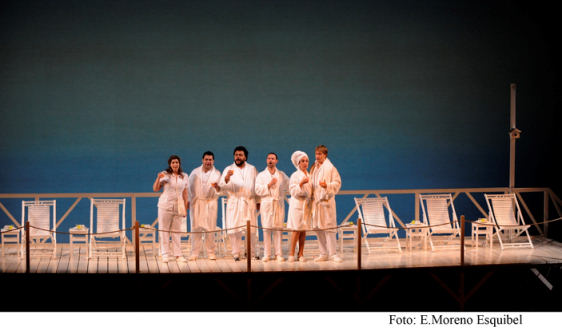Other Links
Editorial Board
-
Editor - Bill Kenny
Founder - Len Mullenger
Google Site Search
SEEN
AND HEARD INTERNATIONAL OPERA REVIEW
Rossini, Il Viaggio a Reims:
Soloists,
Bizkaiko Orkestra Sinfonikoa, Conductor: Alberto
Zedda, Teatro Arriaga de Bilbao. 17.12.2008 (JMI)
Production from Madrid’s Teatro Real in collaboration
with Festival Rossini de Pesaro
Direction: Emilio Sagi
Stage elements: Emilio Sagi
Costumes: Pepa Ojanguren
Lighting: Eduardo Bravo
Cast:
Madame Cortese: Ellie Dehn, soprano
Corinna: Auxiliadora Toledano, soprano
C.Folleville: Rocío Ignacio, soprano
M.Melibea: Lola Casariego, mezzo-soprano
C.Liebenskof: Maxim Mironov, tenor
Ch.Belfiore: Yi Yie Shi,tenor
Lord Sydney: David Menéndez, bass
Don Profondo: Savio Sperandio, bass
B.Trombonok: Valeriano Lanchas, bass
Don Alvaro: Troy Cook, baritone
Don Prudenzio: Carlos García-Ruiz, bass

This performance gave us the opportunity to see Emilio Sagi’s creation once more – and this is probably the most profitable production in the history of opera. It is a very simple interpretation, and shows that you do not need to spend masses of money to offer something attractive on stage. Good use of imagination and good work with actors is the key in this case, as it should be always. The production itself consists of a footbridge elevated over the front of the stage, with a simple painted curtain at the back and a row of sun loungers. The action takes place in a spa, where the different customers take their thermal baths dressed in simple white bathrobes, while the employees wear white uniforms. In the second act, everybody changes the bathrobes for black formal dresses, with the ladies wearing very funny hats. For all its simplicity, the production works very well thanks to the excellent work that Sagi does with all the singers, so that the action does keeps one interested at all times.
Veteran
Alberto Zedda was in charge of the musical direction. I will never
forget the first time that I saw him conducting this opera, about
eight years ago in Corunna and it was a magical performance. To have
Alberto Zedda in the pit of Teatro Arriaga and conducting Rossini is
an genuine luxury for local spectators, and it would not be too much
to say that he could even be considered Rossini’s ambassador to the
world. His work was good, although not at the same level as years
ago although It is also true to say that the orchestra was not the
same and that makes a big difference. I must add however that the
ensemble of young musicians sounded better than on other occasions
in the past.
American soprano Ellie Dehn cannot be described as ‘promising’
since she already has a firm reputation as a singer. She was a very
good Madame Cortese, showing a pleasant voice and a very good
technique. Countess Folleville was Rocío Ignacio, whose performance
was a very pleasant surprise. I found her much better than I had
expected and I believe she is not been fully appreciated by opera
theatres in Spain.
Auxiliadora Toledano was a good Corinna, with vocal characteristics
similar to Ms. Ignacio. The role of the poetess is a real gift for a
young soprano, although Ms. Toledano had some problems with the last
verses in praise of Charles X. On the other hand, Lola Casariego
was once again the Marquise Melibea, and she was rather
disappointing. She was vocally rather weak and I do not understand
her presence in this cast.
Count Liebenskof was the Russian tenor Maxim Mironov, as in Pésaro
in 2006. He is a very good light tenor, singing with very good taste
and an exceptional breath control. His main problem is that his
voice is quite small which can be a serious handicap in any big
house. Chevalier Belfiore was sung by the Chinese Yi Yie Shi. At
25, this light tenor offers a pleasant voice, also on the small
side, but with exceptional abilities as an actor.
The bass clef was not very well served. David Menéndez was again
Lord Sydney and he was correct with the notes, although his voice is
not to my liking. Brazilian Savio Sperandio was a Don Profondo
without the necessary vocal weight. Valeriano Lanchas is a very
appropriate singer for secondary roles, but Baron de Trombonok is
too much for him. American Troy Cook, as Don Alvaro, offered a
pleasant light baritone, but his voice is not very well projected
and can lose audience interest.
In the secondary roles, the best came from Carlos García-Ruiz as
Don Prudenzio. It is a pity that his high register has not the same
quality as the middle range.
It seems that the arrival of Emilio Sagi to Arriaga had a positive
effect at the box office. There were few empty seats, although at
the same time at the big Palacio Euskalduna there was Joyce DiDonato
in concert. (Some co-ordination between both theatres would be
welcome to prevent these clashes). The biggest ovations went to the
three sopranos, both tenors and Maestro Zedda.
Jose M Irurzun
